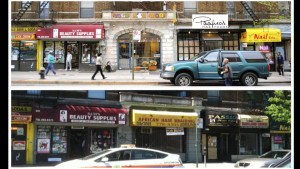Gentrification, Polarization and Shifting Consumption Landscapes

While scholars have explored the catalysts (e.g. government zoning policy, real estate development) and consequences (e.g. residential and commercial displacement) of gentrification, little research has been undertaken to show what happens during the transitional period after gentrification has begun, but before displacement is widespread. As more affluent residents flow in, yet many longtime, less affluent residents remain, the neighborhood becomes polarized along a socio-economic axis. Our project aims to illustrate precisely that moment in the process of neighborhood change, when old and new residents, and old and new consumption spaces, exist side-by-side. We are interested in the social, material, and psychological effects of this polarization on the residents in the community. Our project looks at a commercial street in Crown Heights, Brooklyn to document changes in the consumption landscapes of food, housing and spaces of social interaction, and how both longtime and new residents are navigating this changing terrain. We are conducting interviews and closed-ended surveys with longtime and newer residents, and are also deploying mapping techniques, which lend well to a spatially-based project such as this. By closely examining the effects of polarization on the community in a changing neighborhood, this research offers valuable insights into a significant, yet understudied aspect of the processes of gentrification. In addition, we argue that our project also contributes illustrative evidence and understanding of the process of displacement that has frequently been suggested as an accompaniment to gentrification.
This project is being conducted in collaboration with Maura McGee, under the supervision of Dr. Sharon Zukin.
Past Presentations:
- Hackett, K. McGee, M. and Zukin, S. (March, 2015). Polarizing Neighborhoods: The Material, Social and Psychological Consequences of Shifting Consumption Landscapes.
- Presented at the annual meeting of both the Easter Sociological Society, New York City, and the Association of American Geographers, Chicago.
- Zukin, S., Hackett, K., McGee, M. (August, 2014). Mesocosms of Social Inequality: Consuming New York City Neighborhoods. Thematic Session, Annual Meeting of the American Sociological Association, San Francisco.